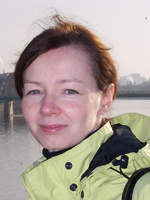Nicole Neef |
|
|
|
|
||
EDUCATION |
Nicole Neef |
|
|
College / University |
Affiliation-Address: |
|
PROJECTS / RESEARCH |
||
|
||
SCHOLARSHIPS |
||
|
Scholarship of the „Stifterverband für die Deutsche Wissenschaft“, „Walter und Ilse Rose Stiftung“ |
||
SCIENTIFIC INTERESTS AND GOALS |
||
|
The ability to move about 50 muscles in a coordinated fashion in order to produce 5 to 6 intelligible syllables per second depends on highly integrated neuronal mechanisms. Our present understanding of the underlying neurobiology of speech production is far from comprehensive. Especially interesting for me is the expertise of Goettingen based groups in transcranial magnetic stimulation (TMS) and diffusion tensor imaging (DTI). This will be necessary for me to successfully continue my research with which I hope to shed light on the particularly frequent speech disorders: the developmental persistent stuttering and the dysarthria. In the long run I would like to use new findings on the mechanisms of speech production to advance the development of scientifically founded methods of speech therapy. |
